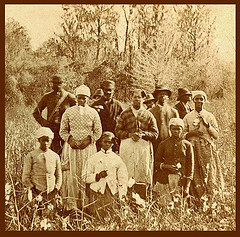
Photo by Flickr user <a href="www.flickr.com/photos/24443965@N08/">Okinawa Soba</a> under Creative Commons.
The U.S. Senate voted unanimously yesterday to apologize for U.S. slavery and the Jim Crow laws that followed. Upon first reaction, this seemed to me like “too little too late.” The resolution, following a similar vote in the House last year, seemed especially insignificant because it did not include reparations for slaves’ descendents. But as The Root, an online magazine providing “news from a variety of black perspectives” notes, the apology is “better way, way, way late than never.”
It turns out the United States government has a history of apologizing to ethnic minorities for their systematic opression. Below are some of the top examples:
- In 1988, President Reagan signed an Act apologizing to Japanese Americans interned in work camps during World War II. The Act promised $20,000 to each of the 60,000 detainees still living.
- In 1997, President Clinton apologized to the African American community for the Tuskegee Experiment, which put African Americans at risk of often dangerous treatments for syphilis. “We cannot be one America when a whole segment of our nation has no trust in America,” he said.
- In 1998, Clinton traveled to Uganda and acknowledged the evils of slavery, but stopped short of offering a formal apology.
- In 2005, the House voted to apologize to America’s native population “for the many instances of violence, maltreatment, and neglect” inflicted against them by the United States.
- Speaking at the Summit of the Americas in April 2009, President Obama acknowledged that the United States has a troubling past relationship with The Americas.” The United States will be willing to acknowledge past errors where those errors have been made,” he said.
Considering some of our worst actions, apologies seem futile, but their symbolic function is actually quite important to the affected communities. Still, Obama’s foes in the GOP have been quick to criticize him as an apologist. Instead of acting as the party of “no apologies,” though, the GOP should let President Obama actively try to restore the United States’ image in the world by apologizing for its most flagrant past mistakes.












